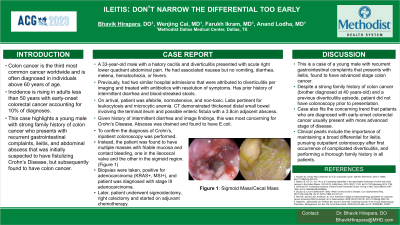Monday Poster Session
Category: Colon
P1636 - Ileitis: Don’t Narrow the Differential Too Early
Monday, October 23, 2023
10:30 AM - 4:15 PM PT
Location: Exhibit Hall

Has Audio

Bhavik Hirapara, DO
Methodist Dallas Medical Center
Dallas, TX
Presenting Author(s)
Bhavik Hirapara, DO1, Wenjing Cai, MD2, Farukh Ikram, MD1, Anand Lodha, MD1
1Methodist Dallas Medical Center, Dallas, TX; 2Methodist Dallas Methodist Center, Dallas, TX
Introduction: Colon cancer is the third most common cancer worldwide and is often diagnosed in individuals above 60 years of age. Incidence is rising in adults less than 50 years with early-onset colorectal cancer accounting for 10% of diagnoses. This case highlights a young male with strong family history of colon cancer who presents with recurrent gastrointestinal complaints, ileitis, and abdominal abscess that was initially suspected to have Crohn’s Disease, but subsequently found to have colon cancer.
Case Description/Methods: A 33-year-old male with a history cecitis and diverticulitis presented with acute right lower quadrant abdominal pain. Had associated nausea but no vomiting, diarrhea, melena, hematochezia, or fevers. Previously, had two similar hospital admissions that were attributed to diverticulitis per imaging and treated with antibiotics with resolution of symptoms. Has prior history of intermittent diarrhea and blood-streaked stools. On arrival, patient afebrile, normotensive, and non-toxic. Labs pertinent for leukocytosis and microcytic anemia. CT demonstrated thickened distal small bowel involving the terminal ileum and possible enteric fistula with a 3.8cm adjacent abscess. Given history of intermittent diarrhea and image findings, this was most concerning for Crohn’s Disease. Abscess was drained and found to have E.coli. To confirm the diagnosis of Crohn’s, inpatient colonoscopy was performed. Instead, the patient was found to have multiple masses with friable mucosa and contact bleeding, one in the ileocecal valve and the other in the sigmoid region. Biopsies were taken, positive for adenocarcinoma (KRAS+, MSI+), and patient was diagnosed with stage III adenocarcinoma. Later, patient underwent sigmoidectomy, right colectomy, and started on adjuvant chemotherapy.
Discussion: This is a case of a young male with recurrent gastrointestinal complaints that presents with ileitis, found to have advanced stage colon cancer. Despite a strong family history of colon cancer (brother diagnosed at 40 years-old) and a previous diverticulitis episode, patient did not have colonoscopy prior to presentation. Case also fits the concerning trend that patients who are diagnosed with early-onset colorectal cancer usually present with more advanced stage of disease. Clinical pearls include the importance of maintaining a broad differential for ileitis, pursuing outpatient colonoscopy after first occurrence of complicated diverticulitis, and performing a thorough family history in all patients.

Disclosures:
Bhavik Hirapara, DO1, Wenjing Cai, MD2, Farukh Ikram, MD1, Anand Lodha, MD1. P1636 - Ileitis: Don’t Narrow the Differential Too Early, ACG 2023 Annual Scientific Meeting Abstracts. Vancouver, BC, Canada: American College of Gastroenterology.
1Methodist Dallas Medical Center, Dallas, TX; 2Methodist Dallas Methodist Center, Dallas, TX
Introduction: Colon cancer is the third most common cancer worldwide and is often diagnosed in individuals above 60 years of age. Incidence is rising in adults less than 50 years with early-onset colorectal cancer accounting for 10% of diagnoses. This case highlights a young male with strong family history of colon cancer who presents with recurrent gastrointestinal complaints, ileitis, and abdominal abscess that was initially suspected to have Crohn’s Disease, but subsequently found to have colon cancer.
Case Description/Methods: A 33-year-old male with a history cecitis and diverticulitis presented with acute right lower quadrant abdominal pain. Had associated nausea but no vomiting, diarrhea, melena, hematochezia, or fevers. Previously, had two similar hospital admissions that were attributed to diverticulitis per imaging and treated with antibiotics with resolution of symptoms. Has prior history of intermittent diarrhea and blood-streaked stools. On arrival, patient afebrile, normotensive, and non-toxic. Labs pertinent for leukocytosis and microcytic anemia. CT demonstrated thickened distal small bowel involving the terminal ileum and possible enteric fistula with a 3.8cm adjacent abscess. Given history of intermittent diarrhea and image findings, this was most concerning for Crohn’s Disease. Abscess was drained and found to have E.coli. To confirm the diagnosis of Crohn’s, inpatient colonoscopy was performed. Instead, the patient was found to have multiple masses with friable mucosa and contact bleeding, one in the ileocecal valve and the other in the sigmoid region. Biopsies were taken, positive for adenocarcinoma (KRAS+, MSI+), and patient was diagnosed with stage III adenocarcinoma. Later, patient underwent sigmoidectomy, right colectomy, and started on adjuvant chemotherapy.
Discussion: This is a case of a young male with recurrent gastrointestinal complaints that presents with ileitis, found to have advanced stage colon cancer. Despite a strong family history of colon cancer (brother diagnosed at 40 years-old) and a previous diverticulitis episode, patient did not have colonoscopy prior to presentation. Case also fits the concerning trend that patients who are diagnosed with early-onset colorectal cancer usually present with more advanced stage of disease. Clinical pearls include the importance of maintaining a broad differential for ileitis, pursuing outpatient colonoscopy after first occurrence of complicated diverticulitis, and performing a thorough family history in all patients.

Figure: sigmoid mass/ cecal mass
Disclosures:
Bhavik Hirapara indicated no relevant financial relationships.
Wenjing Cai indicated no relevant financial relationships.
Farukh Ikram indicated no relevant financial relationships.
Anand Lodha indicated no relevant financial relationships.
Bhavik Hirapara, DO1, Wenjing Cai, MD2, Farukh Ikram, MD1, Anand Lodha, MD1. P1636 - Ileitis: Don’t Narrow the Differential Too Early, ACG 2023 Annual Scientific Meeting Abstracts. Vancouver, BC, Canada: American College of Gastroenterology.
